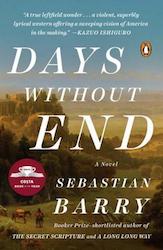
Days Without End won Britain’s Costa Award a year ago and more recently the Walter Scott Prize for Historical Fiction, and Sebastian Barry has been a consistent front-runner for literary prizes, having been shortlisted twice for the Man Booker Prize. So this novel comes with a mountain of praise behind it.
And it is indeed impressive. But I also struggled with it. So I may need to come back to this one in the future. I’m still not entirely sure how I feel about it.
The novel’s narrator is Thomas McNulty, an immigrant from Ireland who came to Canada and then the United States to escape Ireland’s famine in the mid-1800s. He’s unschooled, orphaned, and completely broke, but his common sense and adaptability allow him to get along. As a youth he meets John Cole, another boy with no prospects. Together they form a partnership that ultimately becomes romantic and they spend the rest of their lives together.
They start out as cross-dressing “dancing girls” in a mining-town saloon until they grow out of the illusion. But the experience opens Thomas’s eyes to the fact that he’s more comfortable as a woman than as a man. The rest of the novel takes them through a series of harrowing periods, fighting as Cavalry soldiers in the Indian Wars out west, then as Union soldiers in the Civil War, including a stint in a massive Prisoner of War camp, where they both nearly perish. Then as farmers in post-war Tennessee. (And that leaves out about half of their “adventures.”)
It’s a brilliant look at American history in an unflinching way, but also remarkable in that the main character is struggling with questions of sexual identity at a time when both Thomas and John Cole know it’s not an issue they can be open about.
My only reservation about the novel is the narrative voice. Thomas is unlettered and a product of the streets, and at times he sounds like a refugee from Ireland, and then at other times he sounds like a southern farmer. But mixed into the endless aphorisms and strings of fragments is a philosopher-king strain that’s a little hard to fathom. He seems to change character–markedly–throughout different sections.
There are sections of the novel, however, that are as riveting as anything I’ve ever read about the American frontier, especially when Thomas is describing the action during battles with the Sioux, fighting the Rebels in Virginia, and the POW camp in Tennessee. Those passages are impossible not to read in fevered bursts.
So I’m torn. It’s simultaneously brilliant and maddening, riveting and frustrating. I have a feeling, however, that it will be difficult to forget the intense war scenes.
And it is indeed impressive. But I also struggled with it. So I may need to come back to this one in the future. I’m still not entirely sure how I feel about it.
The novel’s narrator is Thomas McNulty, an immigrant from Ireland who came to Canada and then the United States to escape Ireland’s famine in the mid-1800s. He’s unschooled, orphaned, and completely broke, but his common sense and adaptability allow him to get along. As a youth he meets John Cole, another boy with no prospects. Together they form a partnership that ultimately becomes romantic and they spend the rest of their lives together.
They start out as cross-dressing “dancing girls” in a mining-town saloon until they grow out of the illusion. But the experience opens Thomas’s eyes to the fact that he’s more comfortable as a woman than as a man. The rest of the novel takes them through a series of harrowing periods, fighting as Cavalry soldiers in the Indian Wars out west, then as Union soldiers in the Civil War, including a stint in a massive Prisoner of War camp, where they both nearly perish. Then as farmers in post-war Tennessee. (And that leaves out about half of their “adventures.”)
It’s a brilliant look at American history in an unflinching way, but also remarkable in that the main character is struggling with questions of sexual identity at a time when both Thomas and John Cole know it’s not an issue they can be open about.
My only reservation about the novel is the narrative voice. Thomas is unlettered and a product of the streets, and at times he sounds like a refugee from Ireland, and then at other times he sounds like a southern farmer. But mixed into the endless aphorisms and strings of fragments is a philosopher-king strain that’s a little hard to fathom. He seems to change character–markedly–throughout different sections.
There are sections of the novel, however, that are as riveting as anything I’ve ever read about the American frontier, especially when Thomas is describing the action during battles with the Sioux, fighting the Rebels in Virginia, and the POW camp in Tennessee. Those passages are impossible not to read in fevered bursts.
So I’m torn. It’s simultaneously brilliant and maddening, riveting and frustrating. I have a feeling, however, that it will be difficult to forget the intense war scenes.
 RSS Feed
RSS Feed
